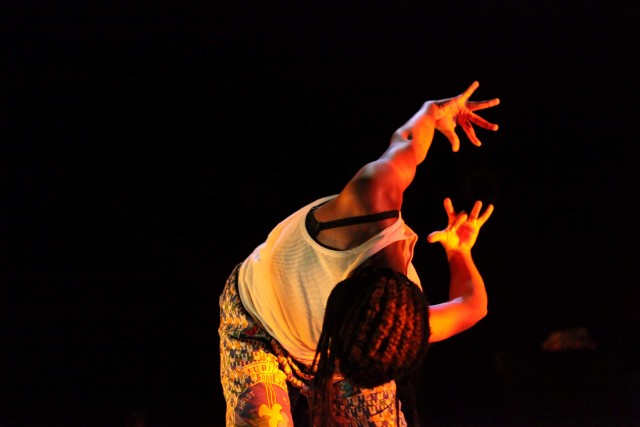
Dorothée Munyaneza recalls personal horrors of the Rwandan genocide in SAMEDI DÉTENTE (photo by Laura Fouqueré)
LuEsther Hall at the Public Theater
425 Lafayette St. by Astor Pl.
January 14-17, $25
212-967-7555
www.undertheradarfestival.com
anahi-spectacle-vivant.fr
Rwandan-born, French-based singer, actress, writer, and dancer Dorothée Munyaneza is mesmerizing in Samedi Détente, as she recalls the fateful month of April 1994 in her native country, when she was twelve years old and genocide was about to be unleashed as Hutu sought to eradicate Tutsi. Munyaneza, barefoot and dressed in multiple colorful layers, speaks starkly to the audience, sings, dances atop a table that she later balances on her head, and holds a knife that drips blood through a hospital tube. With a haunted yet determined look in her eyes, she remembers the death of President Habyarimana, of men with guns arriving at their home and separating her family, of how the rest of the world turned their backs on Rwanda. “They all left us in deep shit and blood,” she says. Her harsh, compelling narrative is accompanied by Ivory Coast dancer Nadia Beugré, who at first stands to Munyaneza’s right, covered in a hood as if she is being held hostage, while on the other side French musician Alain Mahé adds music and sound effects and sharpens knives. But the show, running at the Public Theater’s LuEsther Hall through January 17 as part of the Under the Radar Festival, takes a baffling turn in a vignette in which Beugré performs zouglou, a popular dance style from the Ivory Coast celebrating the joy of life while commenting on current affairs.
Munyaneza, who wrote and directed Samedi Détente for her troupe, Compagnie Kadidi, might be using Beugré’s interlude to contrast the horrors of genocide with the feel-good partying that went on around the globe, and particularly in France and Africa, during those harsh months, but instead it disappointingly dilutes what was a compelling narrative. Munyaneza is able to right things before the finale, but one can’t help but wonder how much more powerful Samedi Détente, which was named after a Rwandan radio show that translates as “Saturday Relief,” would have been if it just focused on its central raison d’être. “How to tell the unspeakable? How to speak about leaving a beloved place? About the circumstances in which you had to flee the cradle of childhood, one day, hiding, on roads scattered with bodies, blood, and silence?” Munyaneza, who had a song on the Hotel Rwanda soundtrack and released her debut solo album in 2010, asks in her artist statement, continuing, “I want to speak though the eyes of those who have seen. I want to share the words of those who were there.” For much of Samedi Détente, she accomplishes just that, not needing the additional artifice. (The January 17 performance will be followed by a discussion with members of the cast and crew.)